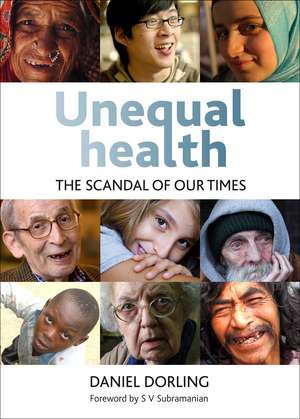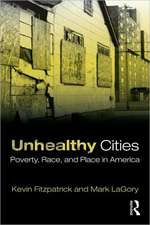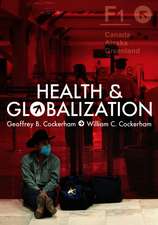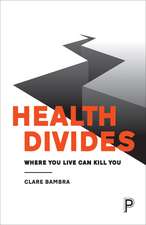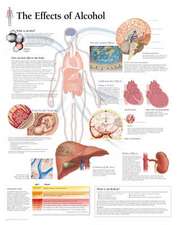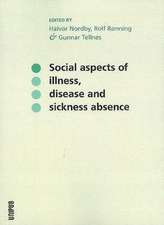Unequal Health: The Scandal of Our Times
Autor Danny Dorlingen Limba Engleză Paperback – 4 mar 2013
Health inequalities are the most important inequalities of all, and in the United States and United Kingdom they have reached a formidable size. In this new book from provocative critic Daniel Dorling, health inequalities are held up as the scandal of our times. While health is generally better now than it was a century ago, the gaps in life expectancy between regions, cities—even neighborhoods—have surpassed the worst measures recorded over the past century. Drawing on international studies, annotated lectures, newspaper articles, and interviews, Dorling provides an authoritative critique of this egregious social problem, calling for immediate action against an injustice that any leading nation should be ashamed to allow.
| Toate formatele și edițiile | Preț | Express |
|---|---|---|
| Paperback (1) | 359.61 lei 3-5 săpt. | |
| Bristol University Press – 4 mar 2013 | 359.61 lei 3-5 săpt. | |
| Hardback (1) | 846.02 lei 6-8 săpt. | |
| Bristol University Press – 4 mar 2013 | 846.02 lei 6-8 săpt. |
Preț: 359.61 lei
Nou
Puncte Express: 539
Preț estimativ în valută:
68.82€ • 71.58$ • 56.81£
68.82€ • 71.58$ • 56.81£
Carte disponibilă
Livrare economică 24 martie-07 aprilie
Preluare comenzi: 021 569.72.76
Specificații
ISBN-13: 9781447305132
ISBN-10: 1447305132
Pagini: 400
Ilustrații: 130 figures, 29 tables
Dimensiuni: 171 x 241 x 28 mm
Greutate: 0.86 kg
Ediția:annotated ed.
Editura: Bristol University Press
Colecția Policy Press
ISBN-10: 1447305132
Pagini: 400
Ilustrații: 130 figures, 29 tables
Dimensiuni: 171 x 241 x 28 mm
Greutate: 0.86 kg
Ediția:annotated ed.
Editura: Bristol University Press
Colecția Policy Press
Notă biografică
Danny Dorling is professor of human geography at the University of Sheffield. He is the author of over twenty-five books, including Injustice, Fair Play, and Bankrupt Britain, all published by the Policy Press.
Cuprins
Sources of extracts
Foreword
S. V. Subramanian, Professor of Population Health and Geography,
Foreword
S. V. Subramanian, Professor of Population Health and Geography,
Harvard School of Public Health
Acknowledgements
Acknowledgements
Section I: The long view
1. Unequal health: why a scandal, and why now?
2. The long view: from 1817 to 2012
3. The ghost of Christmas past: health effects of poverty in London in 1896 and 1991
4. Infant mortality and social progress in Britain, 1905–2005
5. Who cares in England and Wales? The Positive Care Law
Section II: The liberal record
6. Paving the way for ‘any willing provider’ to privatise the NHS
7. Health inequalities and New Labour: how the promises compare with real progress
8. Closer to equality? Assessing New Labour’s record on health after 10 years in government
9. Social harm and social policy in Britain
10. Inequalities in premature mortality in Britain: observational study from 1921 to 2007
Section III: Medicine and politics
11. Medicine is a social science and politics is nothing else but medicine on a large scale
12. Time for a smoke: one cigarette is equivalent to 11 minutes of life expectancy
13. Private finance: ‘Select Committee’s report used parliamentary privilege unacceptably’
14. Government cover-ups: Labour’s ‘Black Report’ moment
15. Putting the sick to work: the real Mental Health Bill
16. Losing votes and voters: would action on inequality have saved New Labour?
17. Mapping inequalities in Britain
18. London’s political landscapes
Section IV: Despair and joy
19. Preserving sanity when everything is related to everything else
20. Suicide: the spatial and social components of despair in Britain, 1980–2000
21. How suicide rates have risen during periods of Conservative government, 1901–2000
22. The inequality hypothesis: thesis, antithesis and a synthesis
23. Housing and identity: how place makes race
24. Border controls? Here’s a long line of reasons to relax
25. ‘Poor kids’, interview with Kerry O’Brien, Australian Broadcasting Corporation
Section V: Global inequality
26. Less suffering
27. How do the other four fifths live?
28. Global inequality of life expectancy due to AIDS
29. Life expectancy: women now on top everywhere
30. Mortality in relation to sex in the affluent world
31. Anamorphosis, the geography of physicians, and mortality
32. The global impact of income inequality on health by age: an observational study
33. Wars, massacres and atrocities of the 20th century
34. Re-evaluating self-evaluation. A commentary on Jen, Jones and Johnston
35. America’s debt to the world
Section VI: Thinking, drawing and counting
36. It’s the way that you do it
37. Worldmapper: the human anatomy of a small planet
38. Using statistics to describe and explore data
39. Socio-demographic diversity and unexplained variation in death rates among the most deprived areas in Britain
40. What if it were not the custard cream that did for them?
Section VII: Changing demographics and ageing populations
41. Growing old gracefully
42. Measuring the impact of major life events on happiness
43. Roads, casualties and public health: the open sewers of the 21st century
44. Tackling global health inequalities: closing the health gap in a generation
45. How will we care for the centenarians of the future?
46. We’re all . . . just little bits of history repeating
47. Future people and shifting power
48. Looking on the bright side
24. Border controls? Here’s a long line of reasons to relax
25. ‘Poor kids’, interview with Kerry O’Brien, Australian Broadcasting Corporation
Section V: Global inequality
26. Less suffering
27. How do the other four fifths live?
28. Global inequality of life expectancy due to AIDS
29. Life expectancy: women now on top everywhere
30. Mortality in relation to sex in the affluent world
31. Anamorphosis, the geography of physicians, and mortality
32. The global impact of income inequality on health by age: an observational study
33. Wars, massacres and atrocities of the 20th century
34. Re-evaluating self-evaluation. A commentary on Jen, Jones and Johnston
35. America’s debt to the world
Section VI: Thinking, drawing and counting
36. It’s the way that you do it
37. Worldmapper: the human anatomy of a small planet
38. Using statistics to describe and explore data
39. Socio-demographic diversity and unexplained variation in death rates among the most deprived areas in Britain
40. What if it were not the custard cream that did for them?
Section VII: Changing demographics and ageing populations
41. Growing old gracefully
42. Measuring the impact of major life events on happiness
43. Roads, casualties and public health: the open sewers of the 21st century
44. Tackling global health inequalities: closing the health gap in a generation
45. How will we care for the centenarians of the future?
46. We’re all . . . just little bits of history repeating
47. Future people and shifting power
48. Looking on the bright side
Index
Recenzii
“Robust collection. . . . The real ‘scandal of our times,’ Dorling concludes, is not that health inequalities have widened but that they persist in spite of improvements in knowledge and technology that could, but do not, benefit all.”
“The breadth and depth of scholarship displayed in this book is staggering—but what impresses just as much is how engagingly Danny Dorling communicates the important truths about the scandal of our times.”
"Professor Dorling is a meticulous scholar who talks personally and directly to the reader rather than to other academics, and with a powerful message: willful ignorance of the social causes of illness and death is taking us back to Victorian levels of inequality."
"Forensic, persuasive, original, impassioned, readable and occasionally even optimistic, Danny Dorling frames inequality in such a way as to demand action. His data and analysis are invaluable ammunition."
